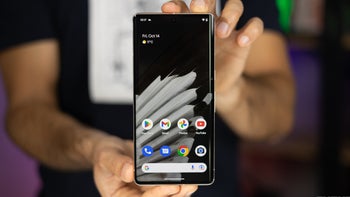Google working on faster OTA updates for its Pixel line

Looking to reduce the time it takes a Pixel user to install an OTA (over-the-air) update, Google has submitted new patches to the Android Open Source Project (AOSP) gerrit. According to Esper's Mishaal Rahman and Android Police, the patches took ten minutes or 43% off the time required to install a 2.2GB OTA update on a Pixel 6 Pro. The patches also reduced the time it took to install an incremental 376MB update to 16 minutes from 22 minutes (a 27% reduction).
Google introduced Seamless Updates for Android with Android 7.0 Nougat (WARNING: seeing Android 7.0 Nougat might set off a nostalgia wave in your mind) which was released in the summer of 2016. The first phones to receive the update were the Nexus 6, Nexus 5X, and the Nexus 6P. But Google never demanded that manufacturers of Android phones include Seamless Update with their devices.
To keep it simple, Pixel models install OTA updates in the background on an inactive part of the phone. While this is happening, the active partition keeps running allowing you to continue using your Pixel as though nothing else was going on. When the installation is finished Pixel users are asked to reboot their phones as the inactive partition with the update installed switches with the active partition. No humans are bored to death with this process since there is no slow-moving install progress bar to watch.
Google is working on making OTA updates faster. A new set of patches has been submitted to AOSP that speed up OTAs on devices that use the virtual A/B with compression update mechanism. Combined, these improvements bring a full OTA install time from ~23 minutes to ~13 minutes! pic.twitter.com/2hDliWzUZZ
— Mishaal Rahman (@MishaalRahman) November 30, 2022
This year Google started using virtual A/B partitions with Android 13 to reduce the amount of additional storage space needed for Seamless Updates. Reportedly the demand for additional storage is what kept Samsung from using this feature on its phones. Newer phones running Android 13 are mandated by Google to be equipped with virtual A/B partitions.
Trying to make this simple, let's just say that Google has been able to reduce the size of device mapping snapshots used in the Virtual A/B updating process by 25% to 40%. Any changes made by the update engine to the snapshots are stored on what is known as "copy-on-write" (COW) devices. Eventually, these changes are merged into dynamic partitions that need to be updated. Google has reduced the merge time by 40%. Once the process is finished, the COW and snapshot devices are deleted giving the user additional storage to use.
Sure, it all sounds like Greek to most Android users (except those that speak Greek) but all you need to know is that you should see your Pixel complete OTA updates faster than ever before once the changes are implemented. And once other Android manufacturers are mandated to follow along, other Android phones will be able to complete OTA updates faster than ever before.












Things that are NOT allowed: